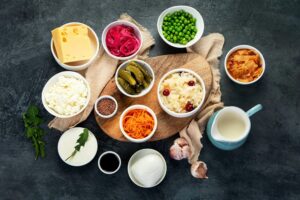Table of Contents
Probiotics: Health Benefits and Foods Rich in Probiotics
Why Do We Need Probiotics in Our Diet?
Probiotics are not just “good bacteria” aiding digestion; they play a crucial role in immunity, balancing microorganisms in the body, and even preventing diseases. But did you know that modern diets often fail to provide adequate probiotics?
According to research published in ISRN Nutrition, incorporating probiotics into daily meals can reduce cholesterol, protect against allergies, aid in cancer prevention, and offer numerous other benefits.

Probiotics: Health Benefits and Foods Rich in Probiotics
What Are Probiotics?
The Role of Probiotics in Health
Probiotics are live bacteria or yeasts beneficial for health, primarily working in the gut. They help digest food, absorb nutrients, and strengthen the immune system.
Potential Issues from Probiotics Deficiency
- Digestive disorders
- Skin problems like acne and eczema
- Weakened immune system
- Increased risk of autoimmune diseases
Rather than relying solely on supplements, prioritize natural probiotic-rich foods to optimize gut health.
Top Foods Rich in Probiotics
Kefir: The “Superstar” of Probiotics
Kefir is a fermented milk drink with a unique flavor, containing up to 34 strains of beneficial bacteria. It’s an excellent option for those who are lactose intolerant.
Sauerkraut: Fermented Cabbage Delight
Sauerkraut not only offers probiotics but is also rich in vitamin C and digestive enzymes.
Kombucha: Energy-Boosting Fermented Tea
Kombucha enhances energy levels and supports liver detoxification due to its fermentation process with black tea.
How to Maximize the Benefits of Probiotics
Combine Probiotics with Prebiotics
Prebiotics, such as green bananas and onions, feed probiotics. Combining both enhances their effectiveness.
Limit Antibiotic-Containing Foods
Antibiotics not only kill harmful bacteria but also affect probiotics. Use them cautiously.
Unique Perspectives
Developing Natural Functional Foods
Rather than relying on artificial products, we should focus on natural functional foods rich in probiotics.
The Importance of Clean Soil
Foods grown in clean, chemical-free soil tend to have more beneficial bacteria.